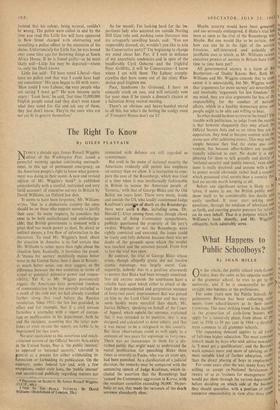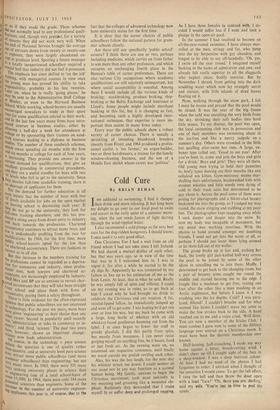What Happens to Public Schoolboys?
By JOAN HILLS
aN the whole, the public school sixth-former Si today does the same as his opposite number esj at the grammar school; he tries to get to lb° ,' university, and if he is unsuccessful he got$ 'e straight into business or the professions. , fr For some years now the Public Schools AP' pointments Bureau has been collecting state' ments from school-leavers as to their career i:itentions. The most striking trend is the increase in the proportion of sixth-form leavers vebs) apply for a university place, from about 42 Pc( cent in 1956 to 59 per cent in 1964—a develor mcnt common to all grainmar schools. The expanding demand applies to all fools of full-time higher education. The most cornmor) remark made by boys who seek advice nowac.13),' is, 'I must get a qualification'; and the 13111V:111' work consists more and more of advising on III` most suitable kind of further education, rather than the direct placing of boys in emplovmal.
For some years after the war, many firms Nei'`,. willing to accept ex-National Servicemen (-) twenty or so as 'trainees for management. all' would put them through the various dem-tin...0 before deciding on which side of the busine° they should specialise, with a position of junior executive responsibility in view after three yeah i I) or so if they made the grade. These schemes 4 did not normally lead to any professional quali- s. °cations, and, though very popular, for a variety J of reasons they did not work very well. When e, the end of National Service brought the average r age of entrants down from twenty or twenty-one 5, to eighteen, they were largely abandoned ex- ii eePt at graduate level. Spotting a future manager in a totally inexperienced schoolboy required a g crystal ball that industry did not feel it possessed. r. The emphasis has since shifted to 'on the job' le t training, with managerial courses in view once 15 the Young man has proved his ability to take responsibility, probably in his late twenties. o Later on, when he is really 'going places,' he e may be sent to the Administrative Staff College LI at Henley, or even to the Harvard Business d hoot. While working, school-leavers are usually encouraged nowadays to study in their spare time for some qualification related to their work; ,,and in the last few years many firms have intro- duced courses in business studies, either by allowing a half-day a week for attendance at College or by sponsoring their trainees on sand- wich courses leading to a diploma in business studies. The number of these sandwich schemes, Winch mean spending six months with the firm and six months at college for each of four years, 13 increasing. They provide one answer to the
1 current demand for qualifications, they give an
11 excellent grounding in commercial procedures, t '1nd,they are a useful standby for boys with two A
they levels who fail to get to the university. Since well inVolve full-time acaderhic training, there is e no shortage of applicants for them.
rs Yet the demand for further education at all `(tsts means that the number of boys with two
o ' levels available for jobs on the open market
leaving school is decreasing each year. If fqY do not go to the university, they look for llime training elsewhere, and this has pro- 'aced a swing away from direct entry to industry and back towards the professions. Chartered rcountancy continues to attract many boys, and navy is undoubtedly profiting from the race for hilla,lihcations. In 1964, for the first time, more 'llelic school-leavers opted for the law than or chartered accountancy. There are fashions in careers as in all' else. ti 131.1t this increase in the numbers training for ,7 Professions cannot be regarded as a depriva- sinn for commerce and industry, since profes- "al men, both lawyers and chartered ac- ountants sare increasingly employed by industry. heli_ki ' A te_ ex and BP are so anxious to recruit char- tered accountants that they will take boys straight oln school and place them with firms of accountants paying them a salary throughout. 0 There is little evidence for the often-expressed pinion that public schoolboys are not interested htechnology. For the past ten years, more boys OtIve given 'engineering' as their choice than any was career. Second in popularity until recently ci.s 'administration or sales in commerce or in- hdustry'; and third, -`science.' The past two years ove, however, shown an important change: of now leads administration. deu,_ f course, in the technology v. pure science lb °ate the question is one of quality rather d,,a_n quantity, and at university level pure science grammar attract more public schoolboys (and more 1/6eldrnimar schoolboys) than engineering; but not bn„Y many more. In 1963, there were 531 more in is seeking university places in science than some engineering (out of a total school-leave of increase In 1964, there were only 244 more potentialscientists than engineers. Some of the crease in the number of university engineer- ing applicants this year is, of course, due to the
fact that the colleges of advanced technology now have university status for the first time.
It is clear that the career choices of public schoolboys follow the national pattern for gram- mar schools closely.
Are there still any specifically 'public school' careers? I think there are one or two, perhaps including medicine, which carries on from father to son more than any other profession, and which occupies an unchanging fourth place in the Bureau's table of career preferences. There are also various City occupations where academic qualifications are still relatively unimportant, but where social acceptability is essential. Among these I would include all the various kinds of broking: stockbroking, produce broking, ship- broking at the Baltic Exchange and insurance at Lloyd's. Some people might include merchant banking in this list, but it is changing so fast, and becoming such a highly developed inter- national technique, that expertise is more im- portant than accent in many firms today.
Every year the public schools show a robust variety of career choices. There is usually a sprinkling of intending bloodstock breeders (mostly from Eton); and 1964 produced a profes- sional cyclist, a 'sea farmer,' an organ-builder, two or three hairdressers, a trainee for the family window-cleaning business, and the son of a Middle East sheikh whose career was 'politics.'















































 Previous page
Previous page